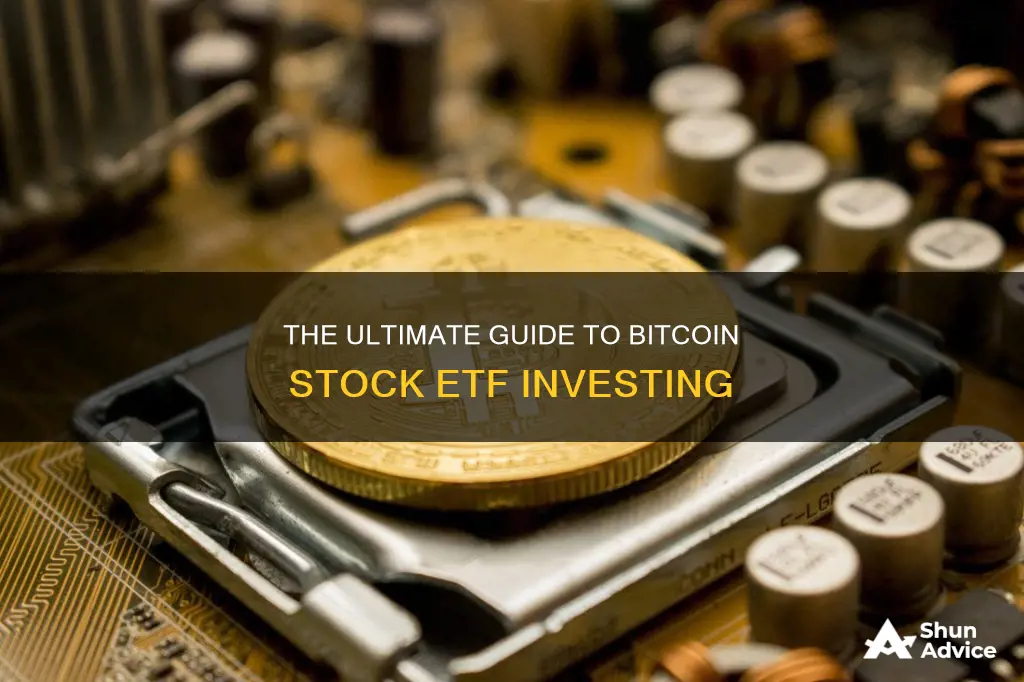
Bitcoin is a cryptocurrency that was created in 2009 by an anonymous figure using the alias Satoshi Nakamoto. It is built on blockchain technology, which allows for a decentralised and unalterable ledger of transactions. Bitcoin is 'mined' using specialised computers that solve complex mathematical equations. There is a finite supply of 21 million bitcoins, and as of 2024, 19 million have been mined.
Bitcoin has opened the doors to pseudonymous transactions, more efficient transfer of capital across borders, and a new digital store of value. It has been a disruptive force since its creation, challenging the business models of financial institutions and central banks. However, the bitcoin economy is still in its infancy, and its growth potential and inherent risks are high.
Due to its volatility, bitcoin can deliver extraordinary gains and losses in the short term. This volatility, along with regulatory uncertainty, has made many investors and regulators uneasy. Funds that hold futures contracts on bitcoin were approved in the U.S. in October 2021, and in January 2024, the first physical bitcoin exchange-traded funds (ETFs) were approved.
A bitcoin ETF is an exchange-traded fund that invests primarily in assets related to bitcoin. ETFs sell shares to investors and use the proceeds to build a portfolio of assets. They are similar to mutual funds but are traded directly on a stock exchange.
A spot bitcoin ETF is an exchange-traded fund that directly tracks the price of bitcoin, primarily by holding a large amount of the cryptocurrency itself. It is similar to a spot gold ETF, which holds physical gold bullion on behalf of its shareholders.
This article will explore how to invest in bitcoin stock ETFs, including the risks and benefits of doing so.
| Characteristics | Values |
|---|---|
| Definition | Exchange-traded funds (ETFs) that invest primarily in assets related to Bitcoin |
| Type | Spot Bitcoin ETFs, Bitcoin futures ETFs, Bitcoin strategy ETFs |
| Benefits | Convenience, Liquidity, Regulatory Oversight, Potential Tax Benefits |
| Risks | Crypto Volatility, Regulatory Uncertainty, Security Risks, Management Fees, Tracking Error |
| How to Invest | Open a brokerage account, Search for the ticker symbol, Enter the number of shares, Click "buy" |
What You'll Learn

What is a Bitcoin ETF?
A Bitcoin ETF, or exchange-traded fund, enables investors to gain exposure to Bitcoin without the hassle of owning it themselves. An ETF is an investment vehicle that is publicly traded, like a stock, but tracks the performance of an underlying asset or index, rather than one company.
A Bitcoin ETF works in much the same way as any other ETF. Investors buy shares in the ETF through whatever brokerage they buy stocks, and can trade them the same way they'd trade shares in any other company. Bitcoin ETFs track the current price of Bitcoin and should act in lockstep with Bitcoin's price swings.
A Bitcoin futures ETF issues publicly traded securities that offer exposure to the price movements of Bitcoin futures contracts. Bitcoin is considered a commodity and is the underlying asset in Bitcoin futures contracts. Bitcoins that sell for cash are said to trade on the "spot" market. With limited exceptions, the Bitcoin spot market is not regulated by the CFTC or the SEC.
A Bitcoin ETF is managed by a firm that buys and holds the actual Bitcoin; the price is pegged to the Bitcoin held in the fund. The firm lists the ETF on a traditional stock exchange, and investors trade the ETF just as they would any other stock. Bitcoin ETFs also offer new types of trading opportunities, including short-selling, where investors can bet against Bitcoin.
The first official Bitcoin-linked ETF was the ProShares Bitcoin Strategy ETF (BITO), which mainly uses futures contracts. It was approved by the SEC in October 2021 and is listed on the New York Stock Exchange.
Strategic Bitcoin Splitting: A Guide to Smart Crypto Investing
You may want to see also

How to invest in a Bitcoin ETF
A Bitcoin ETF, or exchange-traded fund, is a fund that invests primarily in assets related to Bitcoin. ETFs sell shares to investors and use the proceeds to build a portfolio of assets.
Investing in a Bitcoin ETF is a relatively straightforward process:
- Open a brokerage account: Choose from a variety of online brokers available.
- Purchase Bitcoin ETFs: Once your brokerage account is set up, you can purchase Bitcoin ETFs just like you would buy any other stock or ETF. Search for the ticker symbol, enter the number of shares you want, and click "buy."
Things to Keep in Mind
- Expense ratios: ETFs charge an annual expense ratio, which will be deducted from your account.
- Volatility: Bitcoin is a highly volatile asset, and its price has fluctuated significantly over the years.
- Security: While Bitcoin ETFs use multiple security measures, no system is entirely impenetrable, and there is a risk of cyber theft.
- Tracking error: While Bitcoin ETFs aim to mirror Bitcoin's performance, differences between the ETF share cost and Bitcoin's value can occur due to liquidity, management fees, and other factors.
- Regulatory uncertainty: The regulatory landscape for cryptocurrencies is still evolving, and changes in regulations can impact the legality, trading, and valuation of Bitcoin ETFs.
Martin Lewis: Bitcoin Investor or Not?
You may want to see also

Advantages and disadvantages of Bitcoin ETFs
Bitcoin ETFs, or exchange-traded funds, are investment funds that track the value of Bitcoin and are traded on traditional market exchanges. They allow investors to gain exposure to Bitcoin without the complexities of using cryptocurrency exchanges. Below are the advantages and disadvantages of investing in Bitcoin ETFs.
Advantages:
- Convenienceaccessible. Investors do not need to understand the intricacies of Bitcoin or register on a cryptocurrency exchange.
- Diversification: ETFs can contain multiple assets, including Bitcoin and stocks from various companies, allowing investors to reduce risks and diversify their portfolios.
- Regulatory oversight: Bitcoin ETFs operate within regulated financial systems, providing greater investor protection and a more secure investment environment.
- Tax efficiency: As Bitcoin is unregulated and decentralized, many countries do not allow the direct purchase of cryptocurrencies. In contrast, Bitcoin ETFs traded on traditional exchanges are typically regulated and may offer tax advantages.
- Streamlined investing: Bitcoin ETFs enable investors to purchase shares using conventional brokerage accounts, eliminating the need to navigate the complexities of crypto exchanges.
- Reduced volatility risk: Bitcoin ETFs offer investors a way to gain exposure to Bitcoin without directly holding the cryptocurrency, thus reducing their exposure to extreme price volatility in the crypto market.
Disadvantages:
- Management fees: ETFs typically charge management fees, which can accumulate over time for investors with a significant number of shares.
- Inaccuracy: While ETFs track the price of Bitcoin, they may also hold multiple other assets to diversify their portfolio. As a result, a significant increase in Bitcoin's price may not accurately reflect the value of the ETF.
- Restrictions on cryptocurrency trading: Bitcoin ETFs do not have the same flexibility as direct Bitcoin ownership, as they cannot be exchanged for other cryptocurrencies.
- Lack of direct ownership: Investors in Bitcoin ETFs do not own Bitcoin directly. This means they miss out on the advantages of direct ownership, such as the ability to transact with Bitcoin and use it as a hedge against central banks and fiat currencies.
- Tracking error: The performance of a Bitcoin ETF may differ from the actual market performance of Bitcoin due to factors such as fund expenditures and the interval between market trades and fund rebalancing.
- Security and regulatory issues: The cryptocurrency market is still evolving and faces regulatory challenges. It is susceptible to security risks, such as hacking incidents and regulatory crackdowns, which can impact the value of Bitcoin ETFs.
- Higher fees: The fees associated with Bitcoin ETFs may be higher than those of conventional ETFs due to the costs of maintaining and safeguarding the underlying cryptocurrency holdings.
The Perfect Time to Invest in Bitcoin
You may want to see also

Bitcoin ETF vs Bitcoin
Bitcoin ETF vs. Bitcoin
Bitcoin ETFs (exchange-traded funds) have become an increasingly popular way to invest in Bitcoin, but there are some key differences between them and buying Bitcoin directly.
Bitcoin ETFs are a type of investment vehicle that tracks the performance of Bitcoin. They are traded on exchanges and held in traditional brokerage accounts, just like stocks. This means that investors do not need to go through the hassle of setting up a cryptocurrency exchange account, a digital wallet, or managing private keys. Bitcoin ETFs also allow investors to gain exposure to Bitcoin without actually owning any, which can be beneficial if you are not interested in the technical aspects of crypto or want to avoid the risk of losing your crypto assets.
- Simplicity and convenience: For most investors, buying shares in an ETF is much simpler than buying and holding crypto directly. There is no need to create a wallet, find an exchange, or manage private keys and storage.
- Security: By investing in a Bitcoin ETF, you can avoid the risk of losing your crypto assets due to theft, hacking, or other security breaches associated with crypto exchanges and wallets.
- Diversification: Crypto ETFs make it easier to gain exposure to multiple cryptocurrencies, providing a way to diversify your portfolio.
- Regulatory compliance: Bitcoin ETFs are regulated by the SEC, which provides some level of protection for investors.
- Tax advantages: In some cases, you may be able to hold Bitcoin ETFs in tax-advantaged accounts, such as retirement or 401(k) plans.
- Fees: Bitcoin ETFs typically have higher fees than buying Bitcoin directly, including brokerage trade fees and fund expense ratios.
- Limited trading hours: Unlike crypto exchanges, which operate 24/7, Bitcoin ETFs can usually only be traded during regular market hours.
- Lack of ownership and control: With a Bitcoin ETF, you do not own the underlying BTC. This means that you cannot use your holdings for unique crypto applications, such as sending payments to other individuals. You also give up some control over your investment strategy, as you must defer to the fund manager's strategies.
- Price difference: There may be a difference between the price of the Bitcoin ETF and the actual price of Bitcoin, as ETFs trade on separate markets.
- Counterparty risk: The firms offering Bitcoin ETFs hold the actual Bitcoins, so there is a risk associated with security breaches or government actions.
- Ownership and control: When you buy Bitcoin directly, you have complete control over your private keys and assets. You can also use your Bitcoin in various ways, such as sending payments or trading against other altcoins.
- Unlimited trading hours: Cryptocurrency exchanges operate 24/7, so you are not limited by traditional working hours when buying or selling Bitcoin.
- Direct exposure to BTC price: When you buy Bitcoin directly, you don't have to worry about price differences between the ETF and the actual value of Bitcoin.
- Lower fees: Buying Bitcoin directly typically has lower fees than investing in a Bitcoin ETF.
- Technical expertise required: Storing and safekeeping Bitcoin can be challenging and requires a higher level of technical expertise.
- Cannot be included in traditional retirement plans: Bitcoin purchased directly cannot be included in specialized portfolios like retirement or 401(k) plans.
- Not recognized as a financial instrument: Bitcoin is not widely recognized as a financial instrument, which may limit its use and acceptance.
The decision between investing in a Bitcoin ETF and buying Bitcoin directly depends on your individual preferences, technical knowledge, and investment goals. If you are new to crypto and want a simple, regulated way to gain exposure to Bitcoin, a Bitcoin ETF might be the better option. On the other hand, if you are comfortable with the technology and prefer direct ownership and control of your Bitcoin, then buying it directly may be more suitable.
The Crypto Investment: Which Coins are Worthy?
You may want to see also

The future of Bitcoin ETFs
Bitcoin ETFs have had a turbulent history, with the Securities and Exchange Commission (SEC) initially blocking ETFs that directly held Bitcoin before approving them in 2024. The first official Bitcoin-linked ETF was the ProShares Bitcoin Strategy ETF (BITO), which was approved by the SEC in October 2021 and is listed on the New York Stock Exchange. However, this ETF mainly uses futures contracts, rather than directly holding Bitcoin.
However, it is important to note that Bitcoin ETFs come with certain limitations and risks. These include tracking errors, regulatory uncertainty, liquidity issues, and the rolling of futures contracts, which can impact the fund's returns. The regulatory landscape for cryptocurrencies is still evolving, and changes in regulations can impact the legality, trading, and valuation of Bitcoin futures. As such, investors in Bitcoin futures ETFs face a certain level of uncertainty.
Despite these limitations, Bitcoin ETFs are likely to continue gaining popularity, especially among retail and average investors who may not have the assets to purchase Bitcoin directly. The high price of Bitcoin, which has reached nearly $69,000 per BTC in 2021, makes it inaccessible to many retail investors. Bitcoin ETFs provide a more affordable way to gain exposure to Bitcoin within their budget and risk tolerance.
In conclusion, the future of Bitcoin ETFs looks positive, with increasing investor demand and the benefits of a familiar investment type. However, investors should be aware of the limitations and risks associated with these volatile securities.
Shiba Inu Coin: Worthy Investment or Risky Gamble?
You may want to see also
Frequently asked questions
A Bitcoin ETF (exchange-traded fund) is an investment that exposes ordinary investors to the price moves of Bitcoin. It gives investors a regulated way to invest in Bitcoin through their brokerage accounts.
You can invest in a Bitcoin ETF the same way you would purchase any other stock or ETF. Search for the ticker symbol in your brokerage interface, enter the number of shares you want to purchase, and click "buy".
Some of the advantages of investing in a Bitcoin ETF include:
- Convenience: They are more accessible to a broader range of investors and lower the barriers to entry into the crypto market.
- Liquidity: They make buying and selling Bitcoins easier through familiar brokerage accounts.
- Regulatory oversight: They are subject to rules that ensure transparency and protect investors.
- Tax implications: In certain jurisdictions, they could have tax benefits compared with holding cryptocurrencies directly.
Some of the risks of investing in a Bitcoin ETF include:
- Crypto volatility: The most obvious is the market volatility of Bitcoin prices, which could lead to significant financial loss.
- Regulatory uncertainty: There is a lack of a clear regulatory framework to protect investors.
- Security risks: The number of coins that spot Bitcoin ETFs would have to hold to be viable makes them attractive targets for cybercriminals.
- Management fees: These ETFs charge management fees or expense ratios to cover operational costs, which can diminish returns over time.







